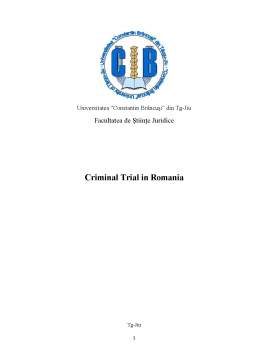Extras din referat
Introduction
Unlike the private lawsuit, the criminal trial has its own legal nature and specific particularities and nature of its own, entailed by the importance of legal relationships it implies.
Currently, the trial model that circumscribes the Romanian criminal trial, which is on the verge of a radical change, may be classified in a certain general typology. Establishing the correct legal nature and identifying the specific particularities allows the orientation of the trial type towards the European model.
At the same time, this operation brings forward serious advantages as well, designed to identify any procedural obstacles but also to propose practical and useful solutions to overcome them.
The core institution of the criminal procedure or criminal procedural law is undoubtedly the criminal trial. Beyond the theoretical implications involved in identifying the technical semantic scope of that concept, the practical, applied dimension of the institution is the having the uttermost relevance in reality.
Following an intensive use at the conceptual level, the term risks losing its identity as a concept and being confused with the subject (content) on which it relates. Both repair and repression are required as a result of the imbalance in the legal order caused by committing an offense.
Discovering crimes, identifying and catching the perpetrators, gathering and administrating evidence, and criminal liability constitute a complex activity, carried out by specialized state bodies, called criminal trial. Therefore, a lawsuit filed by a company lies between the crime ascertained and the punishment, when the rule of law has been violated, against the offender, in order to enforce a judicial punishment provided by law.
The criminal trial has also been defined as the activity required by law, carried out by competent bodies, with the participation of the parties and other individuals, aimed at ascertaining, timely and completely, the facts that constitute the offense, so that any individual having committedan offense would be punished according to its guilt, and no innocent person would be held criminally liable.
Furthermore, criminal trial has been defined as the activity carried out in a criminal case by the judicial bodies, with the participation of the parties and other individuals, as holders of rights and obligations, aimed at ascertaining, timely and completely, the crimes and criminal liability of those who have committed them, so as thereby to ensure the rule of law and protect the rights and lawful interests of individuals.
All these definitions revolve around the essential elements of the criminal trial, setting out its specific features as well. These basic elements are relevant for our analysis to the content as a whole, systemically creating a certain pattern. Over time, during the evolution of the criminal trial, three types or systems of criminal trial are known, different in their structure by development and basic rules. These are: the adversarial trial, the inquisitorial trial and the mixed trial.5 The oldest type of trial, the adversarial trial, assumed the existence of a prosecutor to make accusations against the person considered guilty.
Originally, the victim of the crime could file the charges, and subsequently, especially for much serious crimes, other persons (accusers) could make charges. The criminal trial did not take place in the absence of the accusation made by the prosecutor, without the possibility of referral ex officio of those who settled the dispute. Initially, those who made up the court were citizens of the community, and later on, after many years, professional judges performed the judgment.
The trial within the adversarial court system is characterized by public debate, orality, adversarial character; the accuser is obligated to prove its accusation and the defendant its innocence.
The judge had a limited role, without being able to intervene or act for knowledge and other situations, circumstances than those indicated by the parties, intervening in the trial only to ensure the compliance of judgment rules.
The system has been criticized on the grounds that it offers the accused too many guarantees and too few to the prosecution, and does not create sufficient guarantees for social protection, many of the crimes not being brought to court due to lack of accusation.
The inquisitorial system emerged along with the creation of the state as authoritarian body, circumstances in which the interests of state power are much present against the individual ones. In this context, it was considered that crimes affect both the state and the individual, which is why the state has undertaken to organize the procedural frameworks for the guilty individual to be punished.
The intimation could be made both by the victim and ex officio, by the state representatives. Therefore, the support necessary for triggering the procedures for criminal liability of offenders is represented by the overall social interest, justifying state intervention in organizing criminal repression; the final enforcement of the punishment is perceived as the public reaction to the crimes committed by different individuals.
Referral to the court in this system falls on an authorized person with the status of magistrate. Moreover, the designation of the trial type (inquisitorial) is given by the investigation procedure (per inquisitionem) used by these people.
Subsequently, the Public Ministry performs these tasks. Courts were composed of professional judges, appointed by the government, who were able to intervene in the trial, regardless of the position of the parties involved.
Unlike the adversarial system, the trial was conducted in secret, written and non-contradictory (the accused was not allowed to argue the merits of the evidence against it, and it could only appeal in writing), and the system of evidence allowed consisted of evidence whose value was predetermined by law.
Bibliografie
- Crișu, Drept procesual penal, Ediția a 3 a, revizuită și actualizată, Ed.Hamangiu, 2011. B. Micu, Drept procesual penal. Partea Specială, Ed.Hamangiu, București, 2010.
- http://defensewiki.ibj.org/index.php/Romania;
- http://www.romanianlawoffice.com/trial-litigation-romania.htm;
Preview document
Conținut arhivă zip
- The Criminal Trial in Romania.docx

















